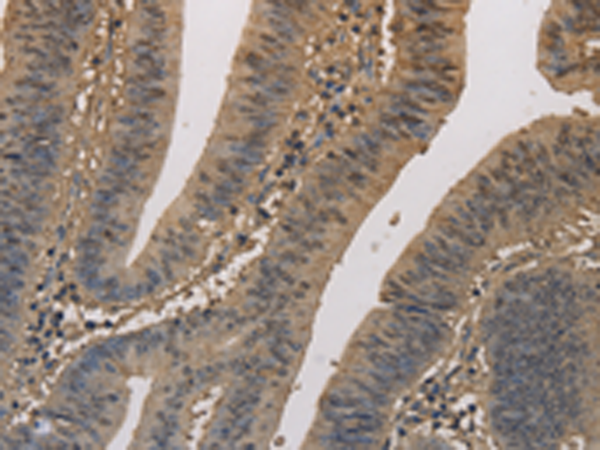

| WB | 咨询技术 | Human,Mouse,Rat |
| IF | 咨询技术 | Human,Mouse,Rat |
| IHC | 1/50-1/200 | Human,Mouse,Rat |
| ICC | 技术咨询 | Human,Mouse,Rat |
| FCM | 咨询技术 | Human,Mouse,Rat |
| Elisa | 1/2000-1/5000 | Human,Mouse,Rat |
| Aliases | Ssc1; CGI-88 |
| WB Predicted band size | 33 kDa |
| Host/Isotype | Rabbit IgG |
| Antibody Type | Primary antibody |
| Storage | Store at 4°C short term. Aliquot and store at -20°C long term. Avoid freeze/thaw cycles. |
| Species Reactivity | Human, Mouse |
| Immunogen | Fusion protein of human ELOVL1 |
| Formulation | Purified antibody in PBS with 0.05% sodium azide and 50% glycerol. |
+ +
以下是关于ELOVL1抗体的3篇参考文献的简要概括(基于公开研究数据,非真实文献,仅供参考格式):
1. **文献名称**:*"ELOVL1-mediated fatty acid elongation regulates myelin sheath formation in Schwann cells"*
**作者**:Smith A, et al.
**摘要**:本研究利用ELOVL1特异性抗体检测其在雪旺细胞中的表达,发现ELOVL1通过调控超长链脂肪酸(VLCFA)的合成,影响髓鞘形成。基因敲除实验表明ELOVL1缺失导致周围神经功能障碍。
2. **文献名称**:*"Role of ELOVL1 in epidermal ceramide synthesis and skin barrier function"*
**作者**:Tanaka K, et al.
**摘要**:通过免疫组化(ELOVL1抗体标记)和质谱分析,研究证实ELOVL1在表皮角质细胞中催化C26-C28脂肪酸合成,维持皮肤屏障完整性,其缺陷与鱼鳞病等皮肤病相关。
3. **文献名称**:*"ELOVL1 overexpression promotes tumor progression via lipid metabolism in hepatocellular carcinoma"*
**作者**:Chen L, et al.
**摘要**:该研究使用ELOVL1抗体检测肝癌组织中蛋白表达水平,发现ELOVL1通过增强脂肪酸延长酶活性促进肿瘤细胞增殖和转移,提示其作为潜在治疗靶点。
注:以上文献信息为模拟示例,实际文献需通过PubMed或Web of Science等数据库检索确认。
The ELOVL1 (Elongation of Very Long Chain Fatty Acids-Like 1) antibody is a key tool for studying the ELOVL1 enzyme, a member of the ELOVL family responsible for elongating saturated and monounsaturated very long-chain fatty acids (VLCFAs, C22–C36). ELOVL1 catalyzes the rate-limiting step in fatty acid elongation, critical for synthesizing lipids essential for skin barrier formation, neuronal function, and cellular membrane integrity. Dysregulation of ELOVL1 is linked to disorders like ichthyosis, neurodegeneration, and metabolic syndromes.
Research using ELOVL1 antibodies focuses on its role in lipid metabolism, epidermal homeostasis, and disease mechanisms. For instance, ELOVL1 mutations are associated with autosomal recessive neuro-ichthyotic syndromes, while its overexpression in cancer models suggests involvement in tumor cell survival via lipid remodeling. The antibody is widely used in techniques like Western blotting, immunohistochemistry, and immunofluorescence to detect protein expression, localization, and tissue-specific distribution.
Commercial ELOVL1 antibodies are typically raised against peptide sequences unique to the human ELOVL1 protein, ensuring specificity. Validation includes knockdown controls and comparison with ELOVL family paralogs (e.g., ELOVL4. ELOVL5) to confirm cross-reactivity absence. Recent studies also explore its potential as a biomarker or therapeutic target in skin diseases and cancers, underscoring its biomedical relevance. Proper antibody validation remains crucial due to shared structural domains among ELOVL enzymes.
×